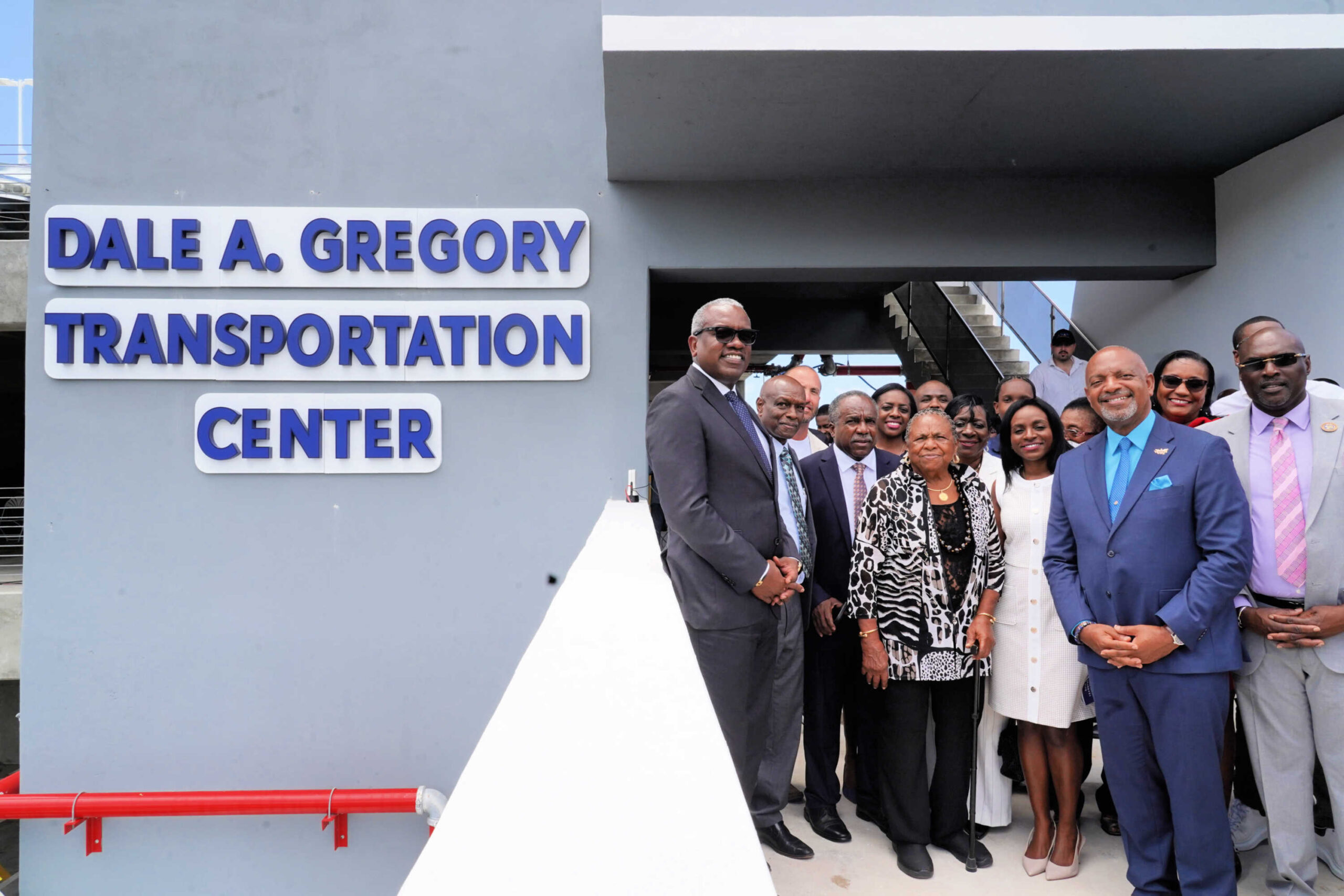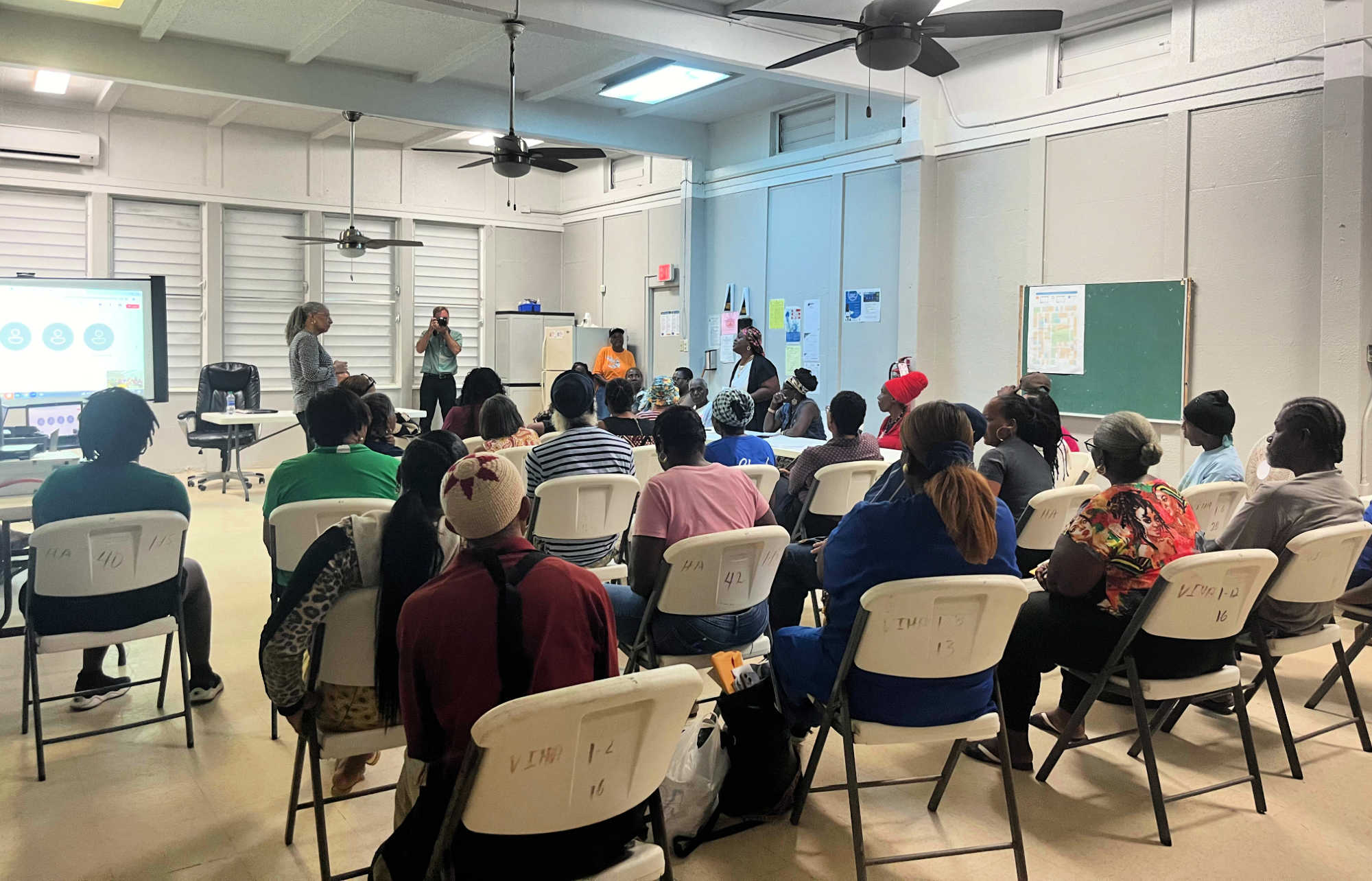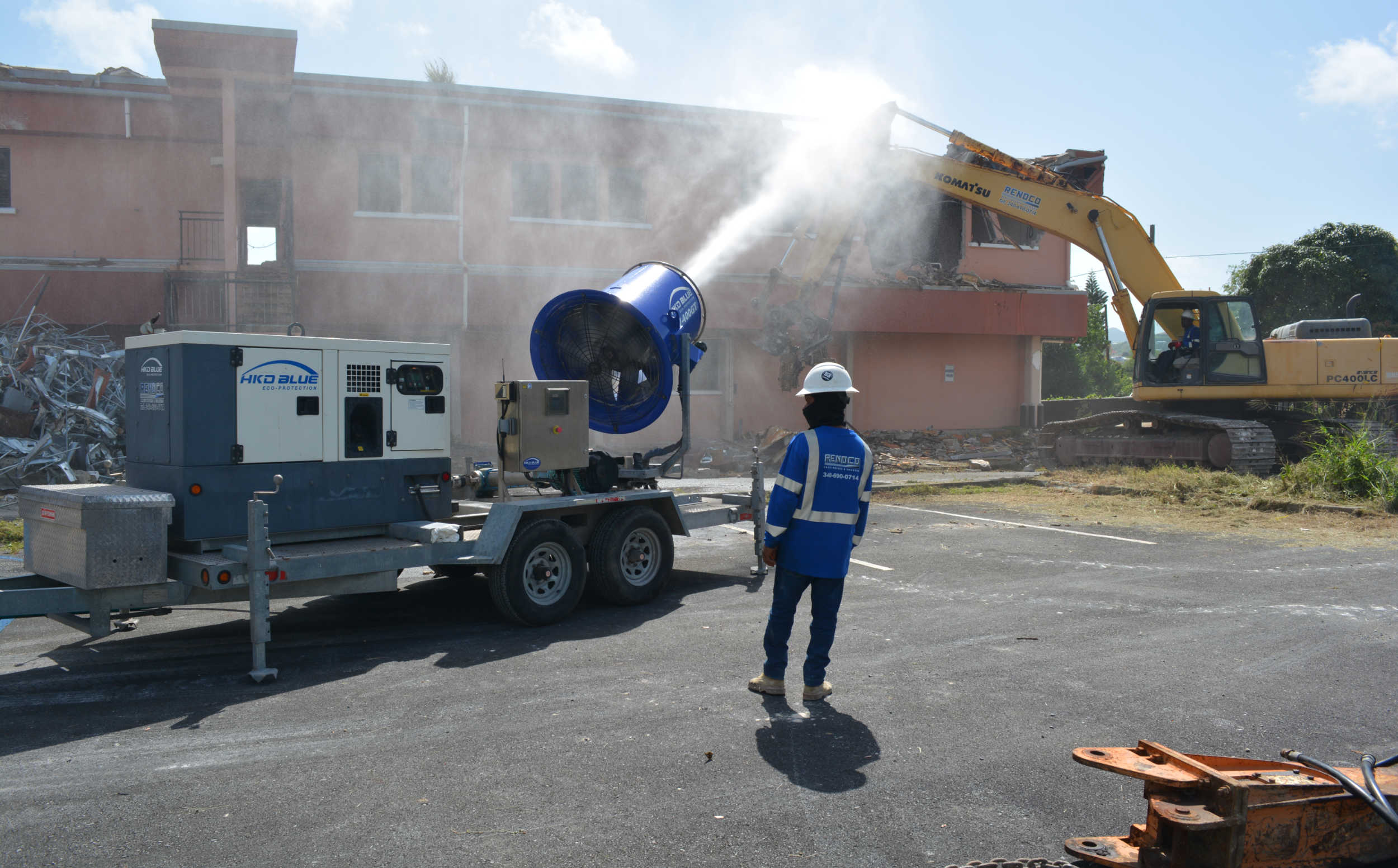Development
Dale A. Gregory Transportation Center Inaugurated in St. Thomas with Celebratory Flair

The Dale A. Gregory Transportation Center, a significant enhancement project by the V.I. Port Authority, was inaugurated with a ribbon-cutting ceremony on Tuesday and is set to open to the public on Monday, April 22. The event marked the completion of the center’s first phase, which will ultimately feature 311 public parking spaces and nine accessible spots. The ceremony was occasionally interrupted by the sounds of ongoing construction, signaling the imminent completion of the project’s second phase expected in May.
Parking at the new facility will be free for the first 15 minutes, with subsequent fees ranging from $4 per hour to $20 daily. Funded by a $20 million grant from the U.S. Department of Commerce-Economic Development Administration awarded in 2019, and complemented by a $6.8 million local contribution, the project stands as a testament to the U.S. Virgin Islands’ commitment to infrastructural progress under the leadership of V.I. Port Authority Executive Director Carlton Dowe.
The inauguration event was attended by notable figures including Senate President Novelle Francis and Governor Albert Bryan, who both praised Dowe’s leadership. “If you want something done, give it to Dowe. Dowe now!” exclaimed Francis, a sentiment echoed by Governor Bryan who expressed unequivocal support for Dowe’s vision.
“We’ve literally watched the Dale A. Gregory Transportation Center take shape from the ground up, and it’s not everyday you’re able to break ground and cut ribbon in a reasonable amount of time,” Senator Francis remarked.
VIPA Deputy Executive Director Anise Hodge highlighted the center as part of broader infrastructural advancements, such as the expansion of airport runways and the creation of the Lindbergh Bay water park. She commended the diligent efforts of VIPA staff and collaborating entities in realizing these projects.
Dale Gregory, the center’s namesake and a veteran engineer with 37 years at VIPA, spoke of the honor and the culmination of his long-standing dedication to the community. “This honor is not just mine. It belongs to every person who has been a part of this incredible journey,” he stated.
Carlton Dowe spent his speech acknowledging the contributions of his team, including Chief of Staff Julice Holder, Chief Financial Officer Ava Penn, Ms. Hodge, and Senator Donna Frett-Gregory, who was VIPA’s CFO prior to her legislative role. He highlighted the importance of leadership in implementing challenging but necessary measures, like the passenger surcharge that partly funded the center.
Dowe also recognized the efforts of contractors and engineers who played pivotal roles in the project, emphasizing the collaborative effort across government bodies that brought the project to fruition. “I really wanted to thank each and every one of you up here, in particular the governing body, because I could have all the ideas I want [but] if I don’t have enough people to support the idea and bring people around, that idea is for nought,” he noted.
Tourism Commissioner Joseph Boschulte pointed out the transportation center’s positive impact on St. Thomas’s tourism, enhancing the convenience of pickups and ground transportation for residents and visitors alike.
Governor Bryan commended Mr. Gregory’s longstanding service and the VIPA team’s dedication, noting that progress is challenging yet essential for transformation. “As we progress through this transformation of our incredible Virgin Islands, I want you to remember that the tunnel might be dark, but there’s light at the end,” he concluded, symbolizing hope for the future amidst ongoing developments.
Development
Bill to Fund Pre-Construction of Charlotte Amalie Dredging Advances

Bill No. 35-0262, which aims to allocate $1.4 million for pre-construction costs in preparation for the dredging of the Charlotte Amalie Harbor, successfully advanced on Thursday in the Committee on Budget, Appropriations and Finance. This progress follows an earlier delay caused by miscommunication that led to its removal from the agenda of its initially scheduled hearing.
The governor’s financial team, who did not attend the original meeting, later informed committee chair Senator Donna Frett-Gregory that they mistakenly believed the bill would not be presented. This confusion arose because another agenda item requiring their presence had also been removed. Although officials from the Port Authority were present, Senator Frett-Gregory stated she was “not inclined to proceed…absent of the representatives of the government that have to speak to whether the $1,434,950 is in fact available to be expended from the Community Facilities Trust Fund.”
At the time, the delay frustrated Carlton Dowe, executive director of the V.I. Port Authority. However, the VIPA team can now be relieved as the measure moved forward to the Committee on Rules and Judiciary following assurances from V.I. Public Finance Authority Director Nathan Simmonds.
“We support the appropriation of the $1.4 million for the soft costs,” Mr. Simmonds confirmed. Although only $1.1 million is currently available for appropriation in the fund, the PFA director explained that the fund’s cash balance exceeds $15 million. “We believe that there are substantial appropriations that will not be expended in the remainder of this fiscal year.” Additionally, the PFA expects an additional $3.4 million from the rum tax cover to be contributed to the fund. “Clearly, we can fund this appropriation,” he assured.
The $1.4 million allocation is intended to cover permits and other preliminary actions necessary for the commencement of the dredging work in the Charlotte Amalie Harbor. Authorities have emphasized that dredging the harbor is crucial to maintaining its capacity and accommodating larger classes of cruise ships. The project is seen as vital for ensuring a competitive edge over other regional tourism destinations.
Development
New Grant Sparks Hope for Homeownership in Williams Delight After Decades of Waiting

Senator Marise James announced a new homeownership grant program during a community meeting at the Williams Delight Center on Thursday, May 30, 2024, offering residents a $15,000 grant towards purchasing a home in the community.
This initiative stems from a town hall meeting last year where residents voiced their long-standing challenges in achieving homeownership. After attending another meeting organized by Williams Delight Residents Council President Mariesha Maynard, Senator James proposed the grant program to Governor Albert Bryan Jr. Funded primarily by the American Rescue Plan Act, the program was developed in collaboration with the St. Croix Foundation and the V.I. Housing Authority (VIHA).
While the grant provides substantial financial aid, applicants must still meet VIHA requirements, including completing a home buyers’ education course. To enhance accessibility, an in-person option of the virtual course is being developed.
Senator James emphasized the importance of homeownership for community transformation, stating, “It’s important that all of us get a piece of that dirt, that rock, a little piece of that island. It’s a beautiful island but we all need to have a little piece of it.” The grant aims to help residents build generational wealth and close the economic gap in the territory. With a two-bedroom unit costing only $22,000, the grant reduces the required personal funds to just $7,000 for prospective homeowners.
Reactions among residents varied. While some welcomed the grant, others were skeptical. A local homeowner expressed concerns about the community being used for political gain and suggested a payment plan for existing homeowners struggling with mortgage payments. In response, Senator James acknowledged the challenge of high mortgage payments as “the reality of capitalism” and referred the payment plan suggestion to VIHA for consideration.
Ms. Maynard highlighted issues with sub-standard repairs on some homes, noting that financially constrained residents often had to hire the cheapest contractors. Senator James assured that the grant process would include selecting reliable contractors and ensuring quality inspections to guarantee residents receive full value for the $15,000 grant.
Ms. Maynard closed the meeting by encouraging financial awareness among residents while celebrating the new grant as a significant milestone in their long journey to homeownership. “Williams Delight is my second home—I’ve been running around here from how long with my aunt—but at the end of the day I didn’t do it for me, I do this for ayo,” she said.
Development
Demolition of Charles Harwood Memorial Complex Main Campus Begins

The V.I. Department of Health has initiated the demolition of the Charles Harwood Memorial Complex’s main campus to pave the way for a new, state-of-the-art public health facility on St. Croix.
“We appreciate the community’s trust as we undertake the construction of this crucial infrastructure for the Virgin Islands,” stated Reuben Molloy, assistant commissioner at the Department of Health, from the demolition site. “Our goal is to reduce health risks, enhance access to quality health care services, and enforce health standards.”
Lemartec USVI, the company contracted for the demolition, began dismantling the eastern-most section of the complex on Thursday.
“It’s an exciting day here at the Charles Harwood Memorial Complex,” said Casey McIntyre, senior project manager for Lemartec USVI. “We’ve completed the initial project phases and are now proceeding with the main building’s demolition, starting with the eastern wing. We’ve cleared the building of all contents in preparation for the demolition.”
The demolition will not involve blasting, and several mitigation measures have been put in place, including privacy and dust screens, a water dust suppression machine, and wind direction monitoring. Lemartec USVI has also developed a Storm Water Pollution Prevention Plan, utilizing best management practices such as silt fencing, storm drain sediment covers, and track-out prevention, and will monitor weather conditions closely.
“We are diligently ensuring a safe site as we proceed with the demolition,” McIntyre added.
The Department of Health has taken steps to minimize disruptions to school activities, business operations, and traffic in the area. In August, Lemartec USVI completed the demolition of the Annex Building, formerly the island’s hospital. In May, the Old Club House and two other buildings at the northeast corner of the campus were also demolished.
The demolition of the complex’s main campus, the final phase, is expected to be completed by October 2024.
Health Commissioner Justa Encarnacion emphasized the department’s commitment to rebuilding the territory’s public health infrastructure. “This progress is due to a dedicated project management team working closely with key agencies and our vendors to keep our disaster recovery projects on track,” Encarnacion said. “We are grateful to the St. Croix community, especially the neighboring Richmond residents, the Juanita Gardine School family, and nearby businesses for their patience and understanding throughout this process.”
“This is part of Governor Albert Bryan Jr’s ‘Rebuild USVI’ plan to expedite the disaster recovery effort,” she added.
Representatives from the VI Office of Disaster Recovery, VI Department of Public Works, VITEMA, Witt O’Brien, The Strategy Group, and FLAD Architect joined the Department of Health on Thursday.
The Charles Harwood Memorial Complex, severely damaged in the 2017 hurricanes, was one of the first projects deemed replaceable by FEMA. The agency awarded the territory $291 million for the complex’s reconstruction, which will adhere to current national construction codes and standards. The Department of Health spent several months securing local approvals, including a historic preservation review.
Upon reconstruction, the facility will be renamed in honor of St. Croix physician and former VI Delegate to Congress, Dr. Donna Christian Christensen.
-

 Education1 year ago
Education1 year agoEducation Board Seeks Input on Schools Through Comprehensive Survey
-

 Education2 years ago
Education2 years agoCTE Board Enthusiastic About New Curriculum Standards, Yet Anxious Over Apprenticeship Support
-

 Crime2 years ago
Crime2 years agoRegistered Sex Offender Detained for Illegal Firearm Possession During Annual Surveillance Drive
-

 Development1 year ago
Development1 year agoCosts Surge as Donoe Estates Housing Project Resumes with New Contractor
-

 Videos3 years ago
Videos3 years ago2022 Gubernatorial Election: Voters Speak Out
-

 Videos3 years ago
Videos3 years agoGubernatorial Teams Celebrate St. Croix’s Bull & Bread Day
-

 Videos3 years ago
Videos3 years agoWakanda’s Female Might: A Dive into ‘Black Panther: Wakanda Forever’
-

 Crime2 years ago
Crime2 years agoSt. John’s Westin Resort Scene of Armed Robbery, Prompting Heightened Police Vigilance




